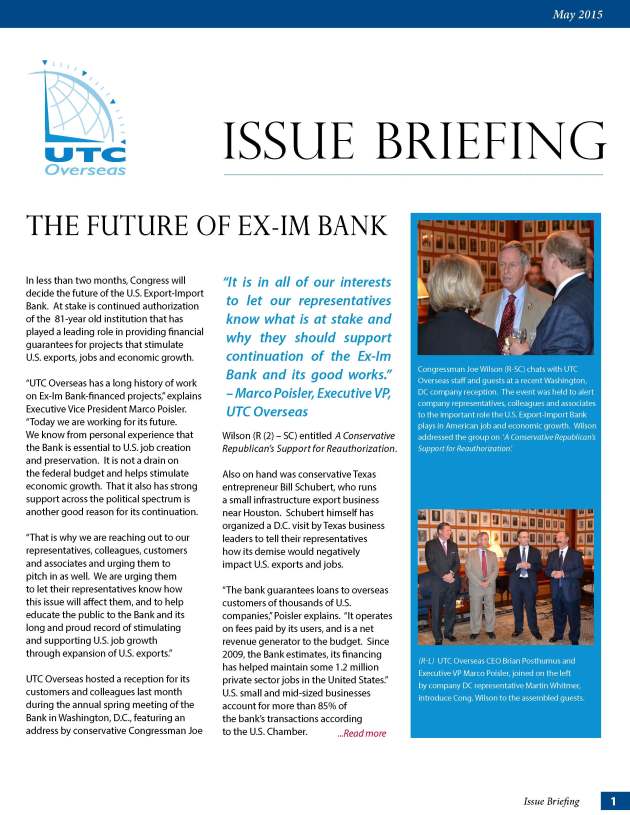Export-Import Bank Near Showdown in Congress
May 29, 2015 1 Comment

Senator Maria Cantwell, Democrat of Washington, tied a vote on trade to a vote on extending the Export-Import Bank.CreditAndrew Harnik/Associated Press
WASHINGTON — In 2013, the impoverished African nation Cameroon teamed with General Electric and the Environmental Chemical Corporation, which is based in Burlingame, Calif., to begin work on a $668 million drinking water project for its thirsty capital, financed with loan guarantees from the Export-Import Bank of the United States.
But as the project moves toward its larger second phase, the threatened demise of the Export-Import Bank, a 70-year-old federal export credit agency, is rippling across Cameroon. The water project is a potential victim of an effort by conservative Republicans to kill the bank.
The Ex-Im Bank reaches a critical moment on Friday: Congress must be notified 35 days in advance of all projects of more than $100 million, and with powerful Republicans bent on letting the bank die when its authorization expires on June 30, all the projects frozen over that review period would die with the bank.
While the bulk of the Ex-Im Bank’s financing is used to support the sale of things like Boeing jetliners to companies abroad, projects like Cameroon’s are also animating a dispute in Congress that is reaching a critical juncture this week.
Senators Maria Cantwell, Democrat of Washington; Heidi Heitkamp, Democrat of North Dakota; and Lindsey Graham, Republican of South Carolina, halted Senate consideration of a major trade bill Wednesday, saying they would try to block a final vote on granting President Obama expanded trade negotiation power until they secured a vote on extending authorization for the Ex-Im Bank beyond June.
Their stand threatens the trade bill. Ms. Cantwell and Ms. Heitkamp are among fewer than a dozen Democrats supporting trade promotion authority. Mr. Obama needs their votes to break a filibuster supported by most Senate Democrats.
Ms. Cantwell and the other senators in her group accuse conservatives of sacrificing American jobs on the altar of what they portray as an ideological crusade.
“I don’t plan to start moving ahead until we stop catering to this minority group that doesn’t support the basic tools that the American people want,” Ms. Cantwell pledged.
She faces an uphill fight. Senator Mitch McConnell, Republican of Kentucky and the majority leader, said he personally opposed Ex-Im’s reauthorization, but he has promised a vote on the matter, which would pass if it comes to a vote in the Senate.
In the House, though, conservatives say a majority of Republicans now oppose reauthorizing the bank. On Thursday, the 170-member Republican Study Committee — a conservative House group — will come out formally in favor of its extinction.
“All we have to do is nothing,” said Representative Raúl Labrador, Republican of Idaho. “I feel pretty good about our prospects.”
Virtually every Republican presidential candidate has been pulled into the campaign to kill the bank.
Representative Justin Amash, Republican of Michigan, said House Speaker John A. Boehner of Ohio could join Democrats to save the bank, but, Mr. Amash warned, “he does so at his own peril.”
Supporters of the Ex-Im Bank say the toll of that campaign is beginning to come into focus. G.E. said this week that a $350 million deal to build locomotives for Angola in Erie, Pa., is about to be lost, with 1,800 jobs.
Boeing says that it will be forced to cede deals in Asia to its only competitor in the wide-body passenger jet business, Airbus, which is based in France.
The looming cutoff of money could compel Cameroon to turn to China, which has already made a competing $850 million bid complete with financing from Beijing’s export credit agency. Executives at G.E. are scrambling for a Plan B, moving the work from its water technology facility in Minnesota to Canada or Hungary, where the company has other plants supported by those countries’ credit agencies.
“You’re talking about a country in sub-Saharan Africa,” said Heiner Markhoff, president and chief executive of G.E.’s water and process technology unit. Commercial banks “aren’t willing to take the risk without an export credit agency. It’s almost contingent on getting to the table.”
The Cameroon project shows the complexity of the issue. Ex-Im opponents say companies as large and powerful as G.E. and Boeing do not need a federal backstop to persuade private banks to finance export projects.
Mr. Markhoff said to some degree that was true — but that conservatives were missing the consequences for American companies that lack G.E.’s deep pockets and connections around the world.
The Environmental Chemical Corporation, with G.E.’s help and Ex-Im loan guarantees, struck the $668 million, three-phase deal with Cameroon’s government, which wanted an American government entity involved as well in what is a public water project.
The first phase — 10 mobile water treatment plants installed in Yaoundé, the capital, as an emergency measure — is done.
Phase 2 — a $532 million effort to move the mobile facilities to where they are needed in southwestern Cameroon while building permanent water plants in the capital — was scheduled to begin soon.
The competing Chinese proposal is part of an effort by Beijing to gain strategic influence in Africa. Its $850 million bid was substantially higher than the cost of the American project, but its financing is not in doubt.
Cameroon’s prime minister, Philémon Yang, has asked the Chinese and American teams to present side-by-side studies of the remaining work, Mr. Eber said. Environmental Chemical Corporation officials have tried to play down the Ex-Im developments in Washington, but he noted that the American study was now delayed pending the showdown.
G.E. officials said that without the support of the Ex-Im Bank, the company could still leverage its global operations to attract government financial backing elsewhere, probably in Hungary or Canada. But that would lead to moving work to the countries where that financing is available.
That could mean leaving a midsize company like the Environmental Chemical Corporation and much smaller suppliers behind. “We have 43 different suppliers in different states for this project,” Mr. Markhoff of G.E. said. “This is not about ‘big corporate welfare.’ ”











